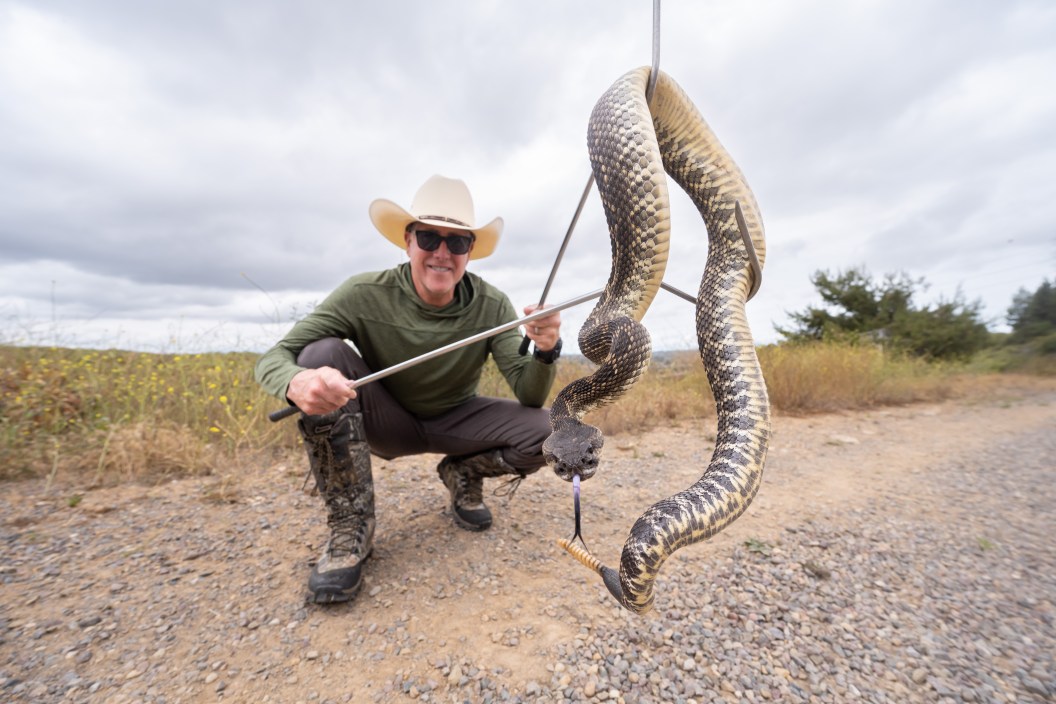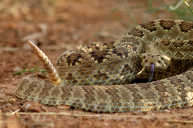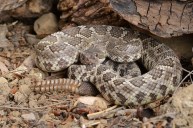Rattlesnakes can strike fear in the hearts of even the most level-headed nature lover—which is fair enough, considering their bites are venomous and can be deadly to humans and pets if left untreated.
So, if you come across one in your yard or around your neighborhood, it makes sense that your first instinct is probably to kill the rattlesnake—but not so fast, according to experts.
Ahead, the pros weigh in on when you should kill a rattlesnake and when it's actually way better—for you and the snake—to have it removed.
Should You Kill Rattlesnakes?
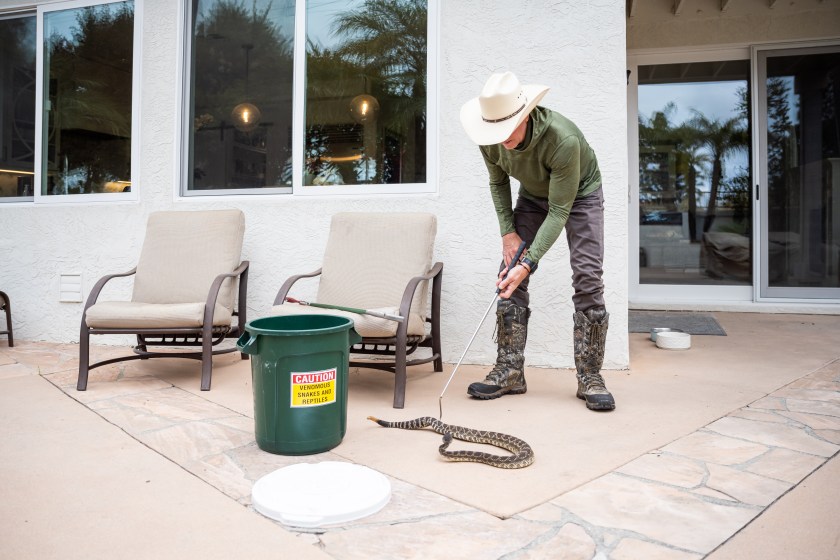
Getty Images, Michael Svoboda
We know it's tempting to grab a rake or a hoe and take care of an errant rattlesnake on your own, but it's not really a great idea, according to every expert we spoke with.
For starters, rattlesnakes aren't all bad. "All snakes are actually a very important part of the ecosystem," says Jeremiah Woodward, service manager with Fox Pest Control in Albany, New York.
Rattlesnakes in particular keep rodent populations in check and kill smaller venomous snakes that many people don't even notice. They also are a food source for other snakes, such as king snakes, Woodward says.
Plus, killing a rattlesnake may not be as easy as you assume. "In many cases, attempting to kill a snake can go awry," says Tyler Young, owner of Placer Snake Removal in Rocklin, California. If you try to kill the rattlesnake by striking a fatal blow and it isn't actually fatal, it can cause a lot of suffering for the snake. "It can take days, weeks, and in some cases months for some wounds to prove fatal," Young says. (Snakes will usually slither away into a hiding place to die.)
And sometimes, you can accidentally kill non-venomous snakes, such as gopher snakes, if you don't know what you're looking for, says Meg Pearson, training manager with the nationwide company Critter Control. Non-venomous snakes are vital to the environment and completely harmless to people. In addition, they are free rodent control, so "it's better to avoid killing them," she says.
There's also your safety to consider. Attempting to kill a rattlesnake is also the easiest way to get it to retaliate, potentially causing you harm, Young says.
A key piece of the puzzle that you also may not think about: Just because you kill one snake doesn't mean there aren't others that will find their way onto your property, especially if your house is a prime snake habitat, says Pearson. You could have a den and not know it.
Lastly, it's illegal to kill snakes in some states, Pearson says.
Bottom line: You should only kill a rattlesnake if, and only if, "it poses an immediate danger that you cannot get out of," Woodward says.
What About Removing Rattlesnakes Yourself?
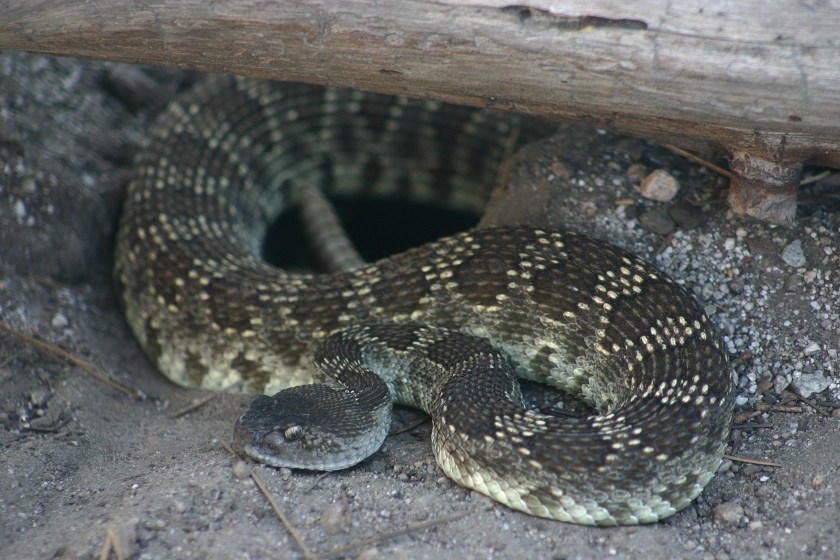
Getty Images
If you're brave, you may be tempted to take on removing and relocating the rattlesnake yourself, but our experts strongly recommend you play it safe and call a professional. They can give you advice and share local laws, because removal or relocation isn't always straightforward. "In some states, it is actually illegal to relocate snakes," Woodard says.
Nuisance wildlife control operators—or snake removal experts, depending on the state—are required to be licensed and trained, and have a permit to "take, euthanize, possess, trap, remove, or transport any snake," says Woodard. This also means they and the snakes are less likely to get hurt during the removal process. "Having a professional who knows how to handle snakes can reduce possible injury and further infestations," Pearson says.
Where Do Rattlesnakes Go After Relocation?
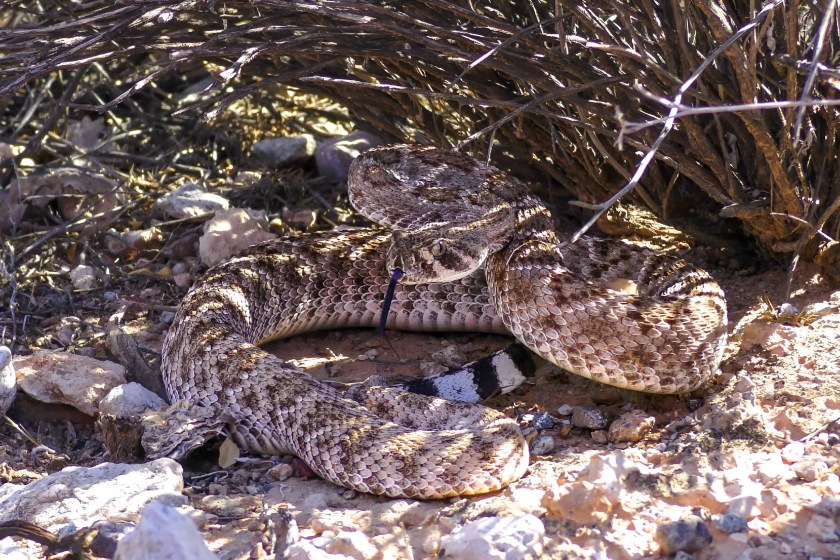
Getty Images
Another reason to call a trained professional is that they have the expertise to make sure the snake is relocated responsibly, not just to any old spot. For example, Young spends time researching the areas to ensure he can "walk to spots off the access roads in order to keep the snakes as far away from any chance of human contact as possible. All of the rattlesnakes I relocate are relocated to a habitat where there are at least three miles in any direction without any structures/people living."
Interestingly, the local cattle ranches in Young's area have come on board to take rattlesnakes as a means of their own pest control, keeping rodents such as gophers at bay. They would rather have the snakes on the land than have their cows get their hooves caught in a gopher hole, Young says.
Of course, rules vary from state to state, and some require that wildlife service managers have the landowner's permission before releasing a rattlesnake.
Will Rattlesnakes Return to the Home After Relocation?
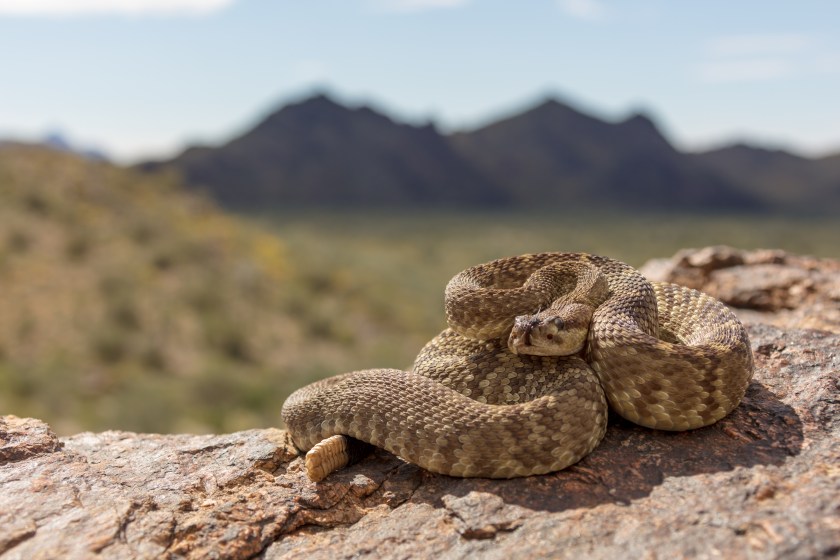
Getty Images
Some good news here: Assuming the snake is taken far enough away, it won't come back. "Rattlesnakes have home ranges, but they do not defend them as territory," Woodard says. "So after a rattlesnake is removed from your home, it generally won't return without a reason (like a large rodent population)."
"If a rattlesnake is relocated within around a mile of the capture point, it may still be able to gather its bearings and figure its way back to its preferred hangout places," says Young. "Beyond a mile, it becomes much less likely for the snake to be able to get back into its usual area."
How to Keep Rattlesnakes Out of Your Yard

Getty Images, Duane Ellison
Once one snake is gone, if you don't make any changes, your home will likely continue to be a welcoming hangout for snakes, and you will get others. To keep rattlesnakes at bay:
- Make your yard less inviting. A great way to start is to keep your landscape trimmed up with grasses short and bushes away from the ground, says Woodard.
- Eliminate debris. Snakes like to find places to hide, so it's best to get rid of rocks, leaves, and other debris piles, Pearson says.
- Reduce snakes by cutting down the food supply. Controlling the rodent and invertebrate populations in your yard will also keep snakes from bothering to visit, Woodard says.
When in doubt, your local snake removal specialist should be able to point you in the right direction. "Trained professionals can help remove the snake, inspect your home and property for what attracted the snake, and keep them out for good," Pearson says.
READ MORE: Hiking in Rattlesnake Country: How to Stay Safe and What to Do if You Get Bit
